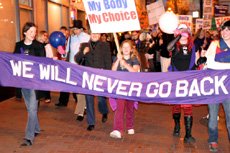The America of our dreams, where every child is welcomed in law – in life, and protected in law, may be some ways away,” President Bush told demonstrators at the annual March for Life rally in Washington D.C. on Jan. 25, “but even from the far side of the river, we can see its glimmerings.” On a day following the thirty-second anniversary of Roe v. Wade, Bush’s words were greeted with applause and cheering from the tens of thousands of anti-abortion activists chanting pro-life slogans on Washington Mall.
NPR reported that Bush also said that he would continue “seeking common ground where possible and persuading increasing numbers of our fellow citizens of the rightness of our cause. This is the path of the culture of life that we seek for our country.”
Norma McCorvey, formerly “Jane Roe” of Roe v. Wade, was also among the demonstrators. McCorvey, who has had a change of stance on abortion, said,
“We look forward to having abortion – the covenant of death – to be overturned.”
Last week, according to Fox News, McCorvey formally asked the Supreme Court to overturn its decision on abortion.
The rally also featured Senator Sam Brownback, (R – Kan.) and other prominent GOP members.
Abortion is one of the most common and safest surgical procedures for women in the U.S. However, only three percent of global abortions occur in the United States, and 90 percent of them are in the first trimester.
Citing his signing of legislation last year banning late-term abortions, the President said that he would work with Congress to pass “good, solid legislation to protect the vulnerable.”
Seven-months-pregnant Guilford Bonner Scholar program coordinator Claire Dixon challenges Bush’s commitment to saving life. She notes the record number of executions that took place under Bush’s term as Texas governor.
Dixon, who is pro-choice, condones abortion in the first trimester of a woman’s pregnancy. Professing no knowledge of the occurrence of viability in the cycle of life, she still argues that execution is a clearer-cut case of killing a human life.
“How is that OK?” she asks. “Bush is not even consistent. How could you be anti-abortion and pro-execution?”
Many women believe that abortion is not an institutional but a personal decision. Senior Julie Balasalle, who is Catholic yet pro-choice, subscribes to such notions.
“I wasn’t always pro-choice. For a while I thought I had to do whatever the Church said,” said Balasalle. “But when I got older and began to understand what goes into making the decision of making an abortion, I changed my decision.”
Like Balasalle, Guilford Sociology and Women’s Studies Professor Kathryn Schmidt is both Catholic and pro-choice.
Schmidt believes that the reason for the heated abortion debate in the United States, which is less prevalent in other countries, is our Puritan heritage. She believes that people are trying to legislate their religious beliefs on issues of abortion.
“Religion is one of the most powerful motivating factors in many people’s lives,” she said.
Physicians for Reproductive Choice (PRCH), a non-profit organization, believes that the conservative political climate has already increased the social stigma associated with abortion, adding to the other subtle barriers that discourage abortion.
For instance, only 18 states allow Medicaid to cover elective abortions. Thirty-two states require parental consent for minors to have abortions, 18 require a mandatory delay and state-directed abortion counseling, and four even prohibit private insurance from covering abortion-related expenses.
Such factors, along with harassment from anti-choice activists, have led to a steady decline in the number of abortion providers over the last two decades.
PRCH estimates that eight percent of all U.S. counties have no abortion providers. In North Carolina, 44 percent of women live in counties that provide no access to safe abortion.
With stricter late-term abortion laws already in place, harsher legislation expected, and several Supreme Court justices around retirement age, the historic 5-4 Roe v. Wade decision itself is at stake.
Schmidt, who was born the same year as Roe v. Wade, cannot imagine living in a world without it. She believes that no other choice or freedom is more important that that which a woman has over her body.
Stripped of such right to privacy, she believes, women will feel helpless.
However, she notes that the overturning of Roe v. Wade would only dismiss national abortion rights; individual states would then have the autonomy to set their own abortion laws.
Given that, according to USA Today, NARAL Pro-Choice America estimates that 19 states would quickly outlaw abortion, and 19 more might follow suit.
“In that case, there would be a big reaction,” said Schmidt. “I understand moral convictions. But I don’t see why criminalizing abortions would be a good thing.”
“I think when you tell someone they can’t do something; they’re going to do it even more,” said Balasalle, especially hinting at teenage pregnancies. “I think the current government stand on abstinence is making things worse. It forces people into a corner, not giving them any alternatives. It is not a very smart policy.”
Balasalle, who interned on Capitol Hill last semester with a pro-choice Catholic Congressman, believes that there is very little compromise going on in Washington.
“People are not being tolerant of the other side, regardless of what the issue is: same-sex marriage, abortion,” said Balasalle.
Bipartisan bickering can only end when a peaceful solution is found. People must find a compromise.

